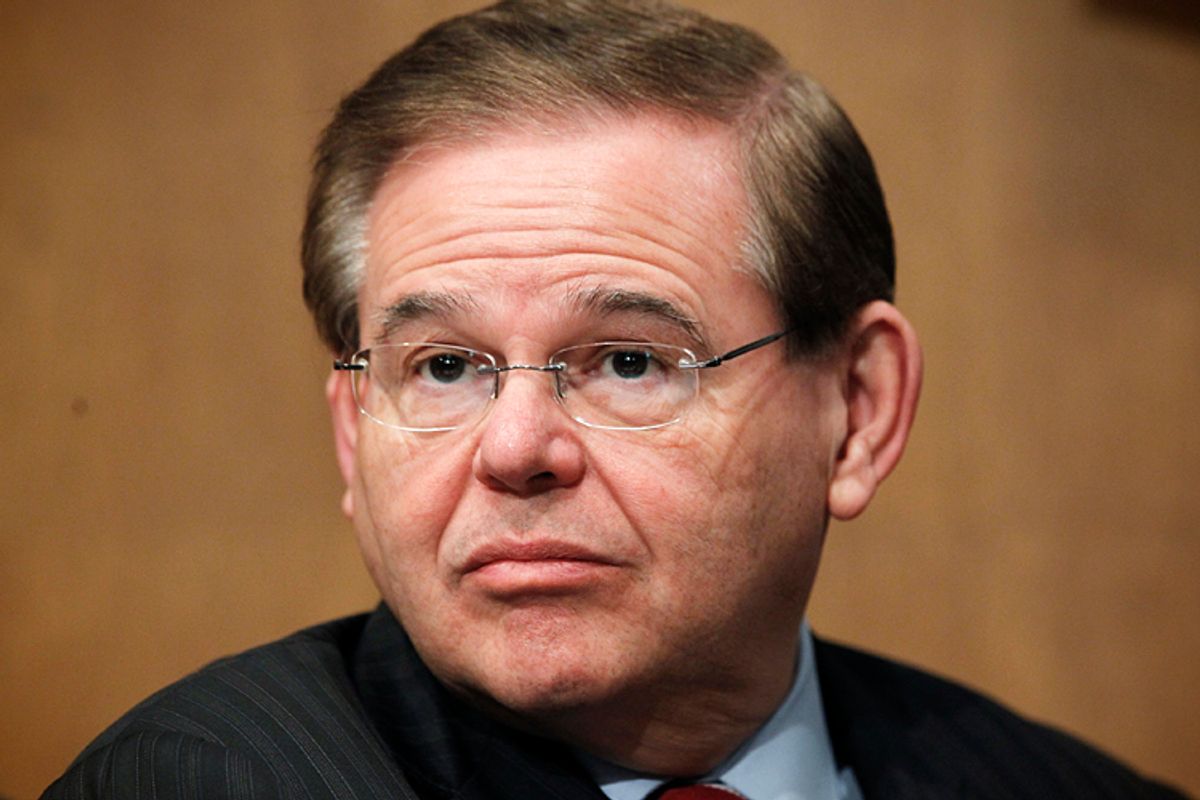Who needs Republicans when you have Democrats like Bob Menendez?
As the Obama administration pursues a nuclear deal with Iran ahead of a summer deadline, the ranking Democrat on the Senate Foreign Relations Committee has emerged as the foremost foe of a diplomatic rapprochement. Along with GOP Sen. Mark Kirk of Illinois, the New Jersey senator is drafting legislation that would impose tough new sanctions on the Iranian economy should negotiators fail to reach an agreement by the June 30 deadline, or if Iran signs an agreement but later reneges on any of its provisions.
Although the new sanctions wouldn't kick in until after June 30, Menendez wants a vote on the bill prior to the deadline for a comprehensive accord. Backers of the legislation contend that it could be a boon to the nuclear talks, which Secretary of State John Kerry and Iranian Foreign Minister Mohammad Javad Zarif resumed this week in Geneva. Show Iran what's at stake for the country if its diplomats don't sign on to a satisfactory agreement, the thinking goes, and it could pressure Iran abandon its nuclear program.
But as arms control experts and administration officials argue, voting to approve new sanctions on Iran would effectively torpedo the efforts to reach an historic agreement with Iran, fostering serious doubts as to whether American officials are negotiating in good faith. Foreign Relations Committee chair Bob Corker, a Tennessee Republican, is also at work on legislation that would give the Republican Congress an up-or-down vote on any agreement diplomats reach. The Menendez-Kirk-Corker push comes as Samantha Power, the U.S. ambassador to the United Nations, says American negotiators stand a "credible chance" of reaching an agreement to their liking.
"We are still at the negotiating table for one reason, and one reason alone," Power said at the University of Louisville's McConnell Center on Monday. "We assess that we still have a credible chance of reaching the agreement we want."
Yet Menendez remains defiant. At a closed-door meeting between President Obama and Senate Democrats in Baltimore on Thursday, Menendez and the president reportedly traded barbs over the senator's sanctions legislation, which Obama said he would veto if it reached his desk. One senator present told the New York Times that Obama maintained Menendez's legislation could undercut American diplomats' negotiating clout and infringe on the president's diplomatic authority. Menendez, for his part, argued that American governments have tried unsuccessfully for two decades to curtail Iran's nuclear ambitions, to no avail.
But it wasn't until 2013 that U.S. negotiators began meeting directly with Iranian diplomats to hammer out an accord, raising the question of why Menendez is so bent on undermining diplomacy at this critical juncture -- particularly given that Congress could easily wait until after the June 30 deadline to vote on any new sanctions. Menendez's record offers some idea of where he's coming from: In 2013, he and Sen. Lindsey Graham (R-SC) introduced a resolution that called on the U.S. to provide open-ended support for any Israeli military action against Iran.
An inveterate Democratic hawk, Menendez has also been a thorn in the administration's side as it has moved to normalize relations with Cuba. Last month, the senator said U.S. measures to establish a diplomatic relationship with the island rewarded the Castro regime's "brutal behavior." Of course, 54 years of U.S. efforts to isolate Cuba didn't spark political change there -- but as Menendez's grandstanding on Iran demonstrates, he's perfectly content to stick with policies that have consistently failed.



Shares